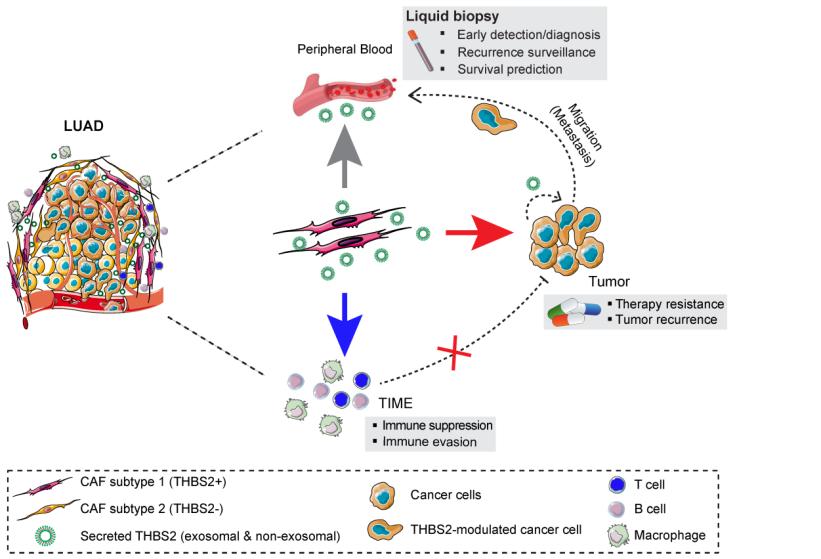Single-Cell and Tissue Exosome Combined Transcriptomic Research Service
Overview Services Features FAQs
Overview
Single-Cell and Tissue Exosome Combined Transcriptomic Research Application
Single-cell transcriptomics has become a widely used tool in various fields such as tumor immunity, tumor microenvironment analysis, neurodevelopment, and reproduction. It plays a crucial role in understanding the tissue microenvironment and addressing the challenge of cellular heterogeneity. However, this technology has encountered bottlenecks. Meanwhile, tissue exosomes—tiny vesicles found in the interstitial space of tissue cells—have garnered increasing attention due to the heterogeneity of exosomes secreted by different cells within specific tissues. Researchers are now focusing on the combined study of exosomes and single-cell transcriptomics to trace the parent cells of various exosome subsets. This approach offers insights into the mechanisms of exosome-mediated intercellular and intertissue communication.
Identifying the cellular origins of key molecules in tissue exosomes is vital for unraveling the mechanisms of exosome action and could provide valuable targets for disease treatment. In one study, a research team discovered through data mining of public databases that the protein THBS2 is linked to lung cancer malignancy and is highly enriched in lung cancer tissue exosomes. To trace the cellular source of THBS2 in these exosomes, they performed single-cell transcriptomic analysis on lung cancer tissues. This analysis revealed that the THBS2-expressing cells were cancer-associated fibroblasts (CAFs). Further functional studies demonstrated that in early invasive lung adenocarcinoma, CAFs secrete THBS2 through exosomes to regulate the tumor microenvironment, impacting tumor immunity, recurrence, and treatment resistance. This research provides a critical foundation for understanding the role of exosomes in tumor progression and highlights their potential as therapeutic targets.
 Fig.1 The workflow showing the evaluation of responses to immune checkpoint inhibitors (ICIs) in LUAD patients.1,2
Fig.1 The workflow showing the evaluation of responses to immune checkpoint inhibitors (ICIs) in LUAD patients.1,2
Creative Biolabs can provide efficient tissue exosome extraction service and single-cell transcriptomic analysis to help customers clarify the exosome communication network.
Services
Single-Cell and Tissue Exosome Combined Transcriptomic Research Service
At Creative Biolabs, for the same tissue sample provided by customers, we can provide efficient single-cell dispersion service and tissue exosome extraction service through differential centrifugation, ultracentrifugation, molecular size exclusion, and ultrafiltration. After the identification of tissue exosomes, we can analyze the tissue microenvironment from the two dimensions of cell subsets and intercellular exosomes through high-throughput transcriptomic analysis. In addition, we can also help customers fully reveal the exosome communication network between cell subpopulations in the tissue microenvironment and discover disease-related biomarkers and drug targets by providing follow-up tissue exosome content analysis service and tissue exosome functional research service.
Features
-
Multi-layered integrated analysis
-
Innovative exosome subpopulation research strategy
-
Providing strong scientific evidence for identifying potential targets
-
Comprehensive data analysis
Exosome-based liquid biopsy and drug delivery research are getting more and more in-depth, and many studies have entered different clinical stages. However, there are still key issues to be solved in the field of exosome research, such as the traceability of exosomes and the function of exosome subsets. As a benchmark enterprise engaged in exosome research and scientific research services for many years, Creative Biolabs always pays attention to the latest developments in the exosome field and thinks about how to improve technology and strategies to provide customers with more innovative and advanced technical services and exosome research solution. If you also want to trace the origin of exosome subsets and study their functions, please contact us without hesitation and leave your specific needs. Based on our most comprehensive omics platform, our professional team can provide evidence for your scientific questions through the most rigorous bioinformatics results.
FAQs
Q: What does the analysis report include?
A: Our analysis report includes correlation analysis between cell subpopulations and exosome subpopulations, source inference of exosomes, subpopulation functional prediction, communication mapping, and more. It is accompanied by visual charts to help you gain deeper insights into the research findings.
Q: What research fields is this combined study service suitable for?
A: Our service is applicable to multiple fields, including but not limited to tumor biology, immunology, regenerative medicine, and neuroscience, making it suitable for any research project that aims to delve into the relationship between cells and exosomes.
Q: How to obtain consultation and pricing?
A: You can click on the "Contact Us" link on the page to fill out the inquiry form or directly contact our customer service team to present your needs and other research details. Our customer service team will respond to your request promptly and provide you with the corresponding quote as soon as possible.
References
-
Yang, H.; et al. Multi-scale integrative analyses identify THBS2+ cancer-associated fibroblasts as a key orchestrator promoting aggressiveness in early-stage lung adenocarcinoma. Theranostics. 2022, 12(7):3104-3130.
-
Distributed under Open Access license CC BY 4.0, without modification.
For Research Use Only. Cannot be used by patients.
Related Services:

 Fig.1 The workflow showing the evaluation of responses to immune checkpoint inhibitors (ICIs) in LUAD patients.1,2
Fig.1 The workflow showing the evaluation of responses to immune checkpoint inhibitors (ICIs) in LUAD patients.1,2









